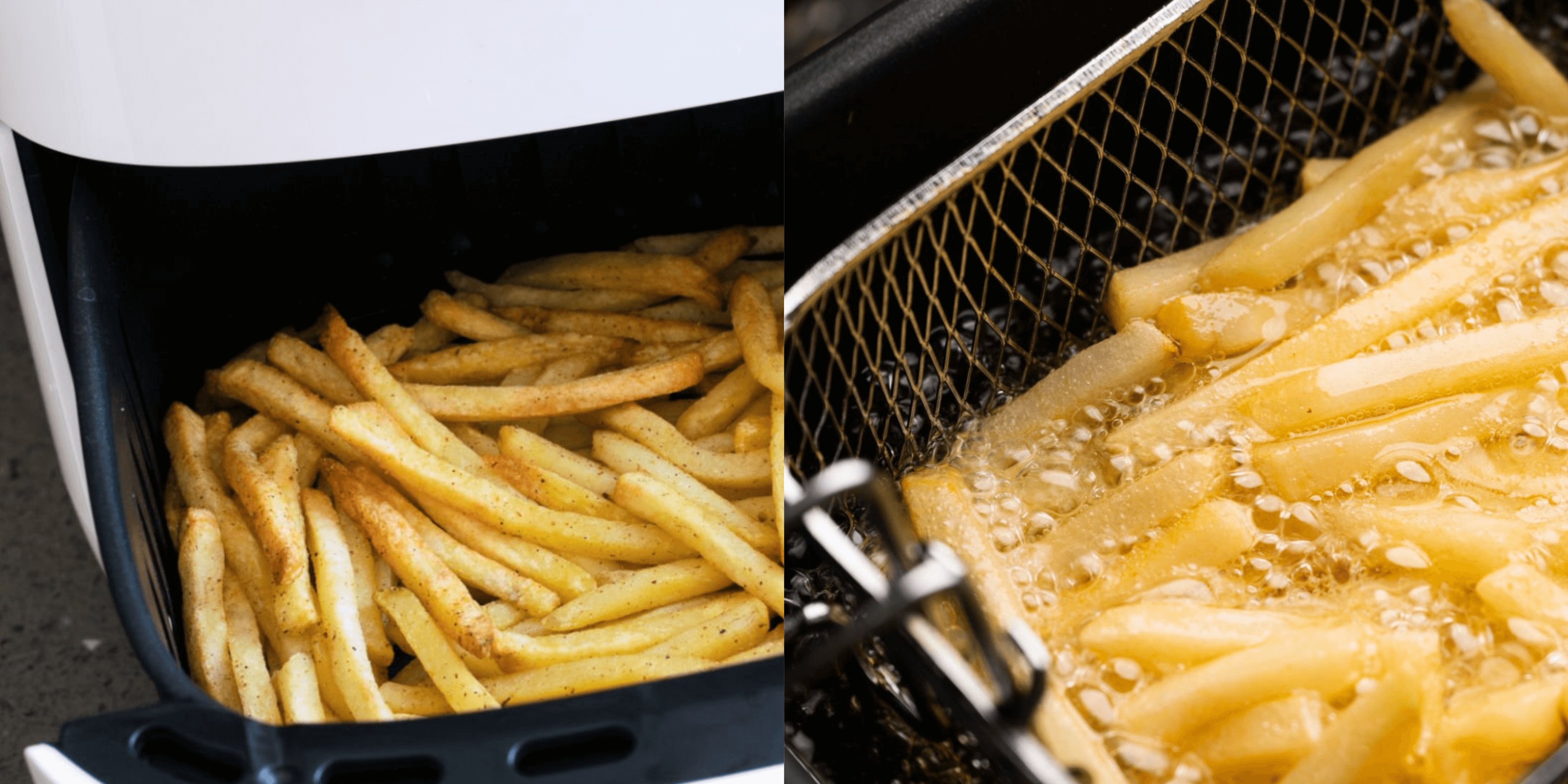In the culinary world, the debate between air frying and deep frying has been a hot topic. Both methods promise crispy, golden results, but which one truly stands out?
In this article, we'll dive deep into the differences, advantages, and disadvantages of both cooking techniques.
Table of Contents
How Do They Work?
Deep Frying
Deep frying is a time-tested cooking method that has been used for centuries across various cuisines. Here's a closer look at the process:
- Submersion: Foods are completely submerged in hot oil, ensuring even cooking from all sides.
- High Temperatures: The oil is typically heated to temperatures between 350°F (175°C) and 375°F (190°C). This high heat ensures rapid cooking, sealing the food's exterior and locking in its natural juices.
- The Maillard Effect: As the food cooks, the Maillard effect takes place. This is a chemical reaction between amino acids and reducing sugars in the food, resulting in the characteristic golden brown color and a rich, complex flavor profile.
- Oil Absorption: While the high heat of the oil cooks the food quickly, it also causes the food to absorb some of the oil, adding to its calorie content.
Air Frying
Air frying is a relatively new cooking technique, gaining popularity for its healthier approach to achieving fried textures. Here's how it works:
- Rapid Air Circulation: Air fryers operate by circulating superheated air around the food at high speeds. This rapid air flow ensures the food is cooked evenly from all angles.
- Minimal Oil: Unlike deep frying, air frying requires very little oil. Most recipes call for a light coating of oil spray or just a tablespoon of oil for flavor and to help achieve that crispy exterior.
- Versatile Temperatures: Air fryers typically have a temperature range from 180°F (80°C) to 400°F (200°C), allowing for a variety of cooking methods from gentle reheating to crispy frying.
- Healthier Results: Due to the minimal oil usage, air-fried foods are generally lower in calories and unhealthy fats compared to deep-fried counterparts. The method also retains more of the food's nutrients, making it a healthier alternative overall.
Key Differences
Oil Usage
- Deep Fryer: Deep fryers operate by immersing food items entirely in hot oil. This method ensures that the food is cooked uniformly, but it also means using a substantial amount of oil, which can be several cups or more depending on the size of the fryer and the quantity of food. The oil not only cooks the food but also contributes to its flavor and texture.
- Air Fryer: Air fryers revolutionize frying by using the power of rapid air circulation. This technology cooks food by surrounding it with hot air, eliminating the need for immersion in oil. Most air fryer recipes recommend just a light spray or a tablespoon of oil to achieve the desired crispy finish, making it a far less oily alternative.
Taste and Texture
- Deep Fryer: Foods that are deep-fried have a distinct, often irresistible taste. The complete submersion in oil gives them a crispy, golden exterior and a moist, tender interior. The oil also imparts a unique flavor that many people associate with comfort food.
- Air Fryer: While air fryers can produce a crispy exterior similar to deep frying, the texture might be slightly different due to the minimal oil used. However, many users find that air-fried foods are less greasy and can have a more pronounced natural flavor.
Versatility
- Deep Fryer: While deep fryers excel at what they do, they are primarily designed for one purpose: frying. They might not be suitable for other cooking methods or dishes.
- Air Fryer: Air fryers are like the Swiss army knives of kitchen appliances. Beyond frying, they can grill, roast, bake, and even reheat food. Their versatility allows users to experiment with a wide range of dishes, from crispy fries to baked pastries.
Cost
- Deep Fryer: Generally, deep fryers have a lower initial purchase cost. However, the ongoing expense of buying oil, especially if you fry frequently, can add up over time, making it a more expensive option in the long run.
- Air Fryer: Air fryers might come with a higher price tag initially. However, the savings from using less oil and their energy efficiency can offset the initial cost over time, making them a cost-effective choice in the broader perspective.
Health Benefits and Considerations
Deep Frying
- Caloric Intake: The oil absorption in deep-fried foods contributes to a higher caloric content. Regular consumption can lead to weight gain and associated health risks.
- Trans Fats: When certain oils are heated to high temperatures, they can produce trans fats. These fats are known to raise bad cholesterol levels, increasing the risk of heart disease.
- Nutrient Loss: The intense heat from deep frying can degrade some of the beneficial nutrients in food, such as certain vitamins and antioxidants.
Air Fryer
- Reduced Fats: One of the standout benefits of air frying is the significant reduction in unhealthy fats. This results in dishes that are lighter and align more with health-conscious diets.
- Fewer Trans Fats: With the minimal oil used in air frying, there's a reduced risk of producing harmful trans fats.
- Nutrient Retention: The gentler cooking process of air frying, combined with reduced oil, means that more of the food's original nutrients, like vitamins and minerals, are retained.
Taste Test
Deep Frying:
- Iconic Flavor: Deep-fried foods have a distinct and iconic taste, characterized by a crispy exterior and a moist, fluffy interior. The oil also imparts a unique flavor that many find irresistible.
- Texture: The complete submersion in oil ensures an even and consistent crispy texture, especially for foods with a wet batter.
Air Fryer:
- Flavor Absorption: Air-fried foods tend to absorb seasonings better, leading to more flavorful results. The lack of excessive oil allows the natural flavors of the food to shine through.
- Texture Variance: While air-fried foods can achieve a crispy finish, the texture might vary, especially for foods traditionally prepared with a wet batter. However, many users find the results to be satisfactory and less greasy compared to deep frying.
Environmental Impact
Deep Frying:
- Oil Consumption: Deep frying requires a significant amount of oil. Once the oil has been used multiple times or becomes degraded, it needs to be disposed of. Improper disposal can lead to environmental hazards, such as water contamination.
- Energy Usage: Deep fryers, especially commercial ones, can consume a lot of energy, especially when they are used for extended periods.
- Waste Production: Used oil containers, filters, and other related waste contribute to environmental pollution if not recycled or disposed of properly.
Air Fryer:
- Reduced Oil Consumption: Air fryers use minimal to no oil, which means less oil is produced, packaged, transported, and eventually disposed of. This significantly reduces the environmental footprint associated with cooking oils.
- Energy Efficiency: Air fryers are designed to cook food quickly, often in half the time or less compared to traditional ovens or deep fryers. This rapid cooking translates to less energy consumption and, consequently, a reduced carbon footprint.
- Waste Minimization: With no or minimal oil used, there's a significant reduction in waste related to oil containers and other associated products.
Frequently Asked Questions
Does air frying taste as good as deep frying?
While the taste is subjective, many find air-fried foods to be just as delicious, if not more flavorful due to better seasoning absorption.
Can an air fryer do everything a deep fryer does?
Almost! However, dishes with wet batter might not come out as expected in an air fryer.
Does an air fryer give the same results as a deep fryer?
In terms of crispiness, yes. But the texture might vary slightly due to the cooking method.
Further Reading
- For individuals worried about the health implications of air frying, we suggest checking out the National Capital Poison Center's article 'Do Air Fryers Cause Cancer?' for a comprehensive review and professional perspectives on the matter.



